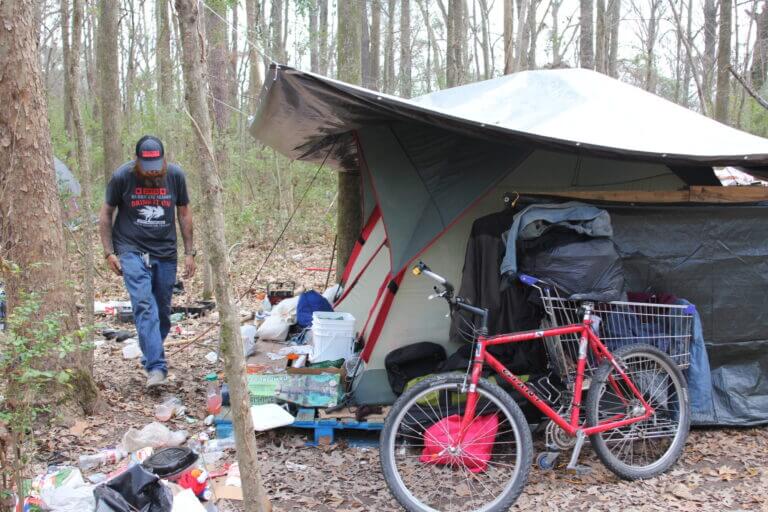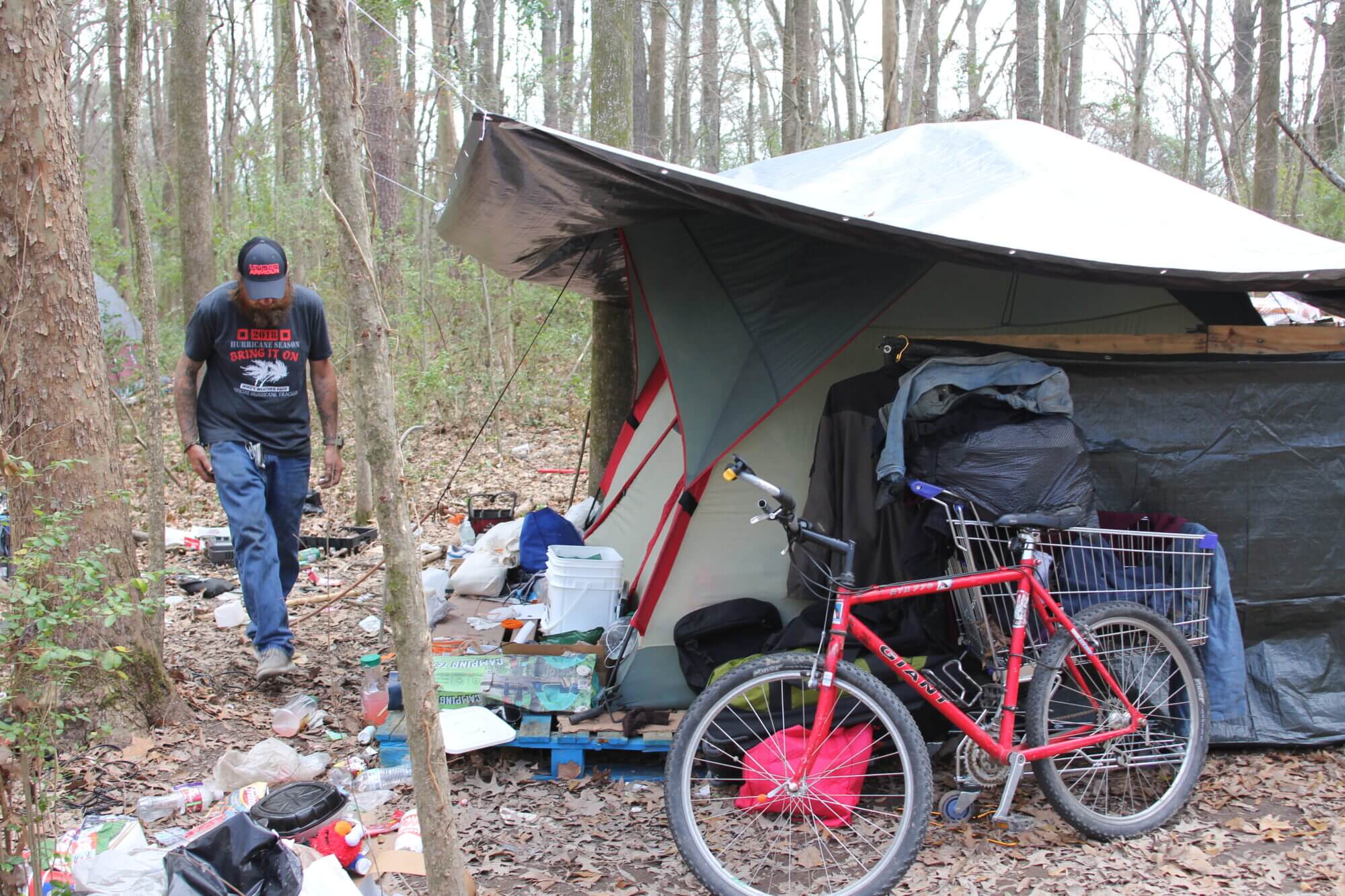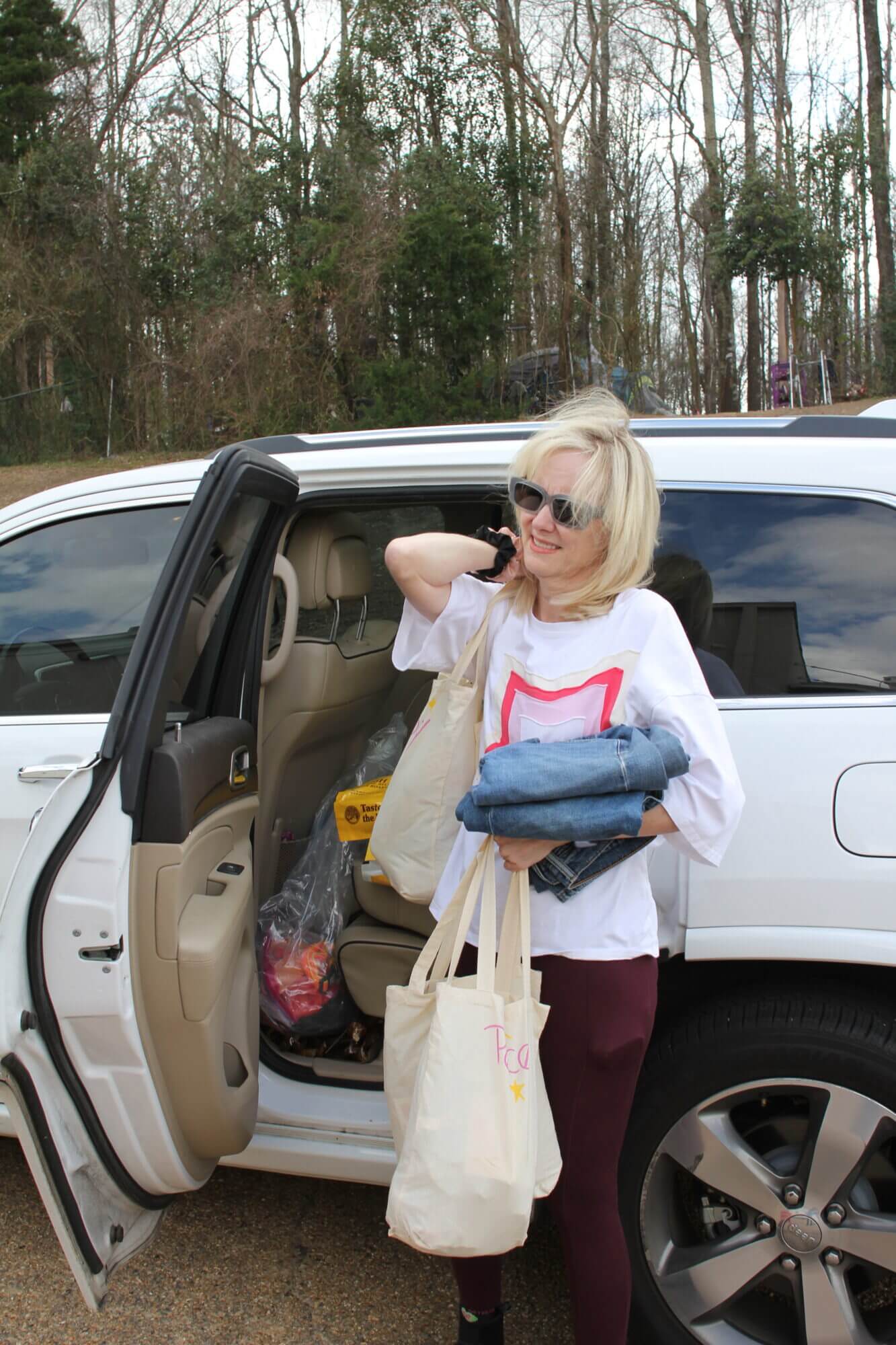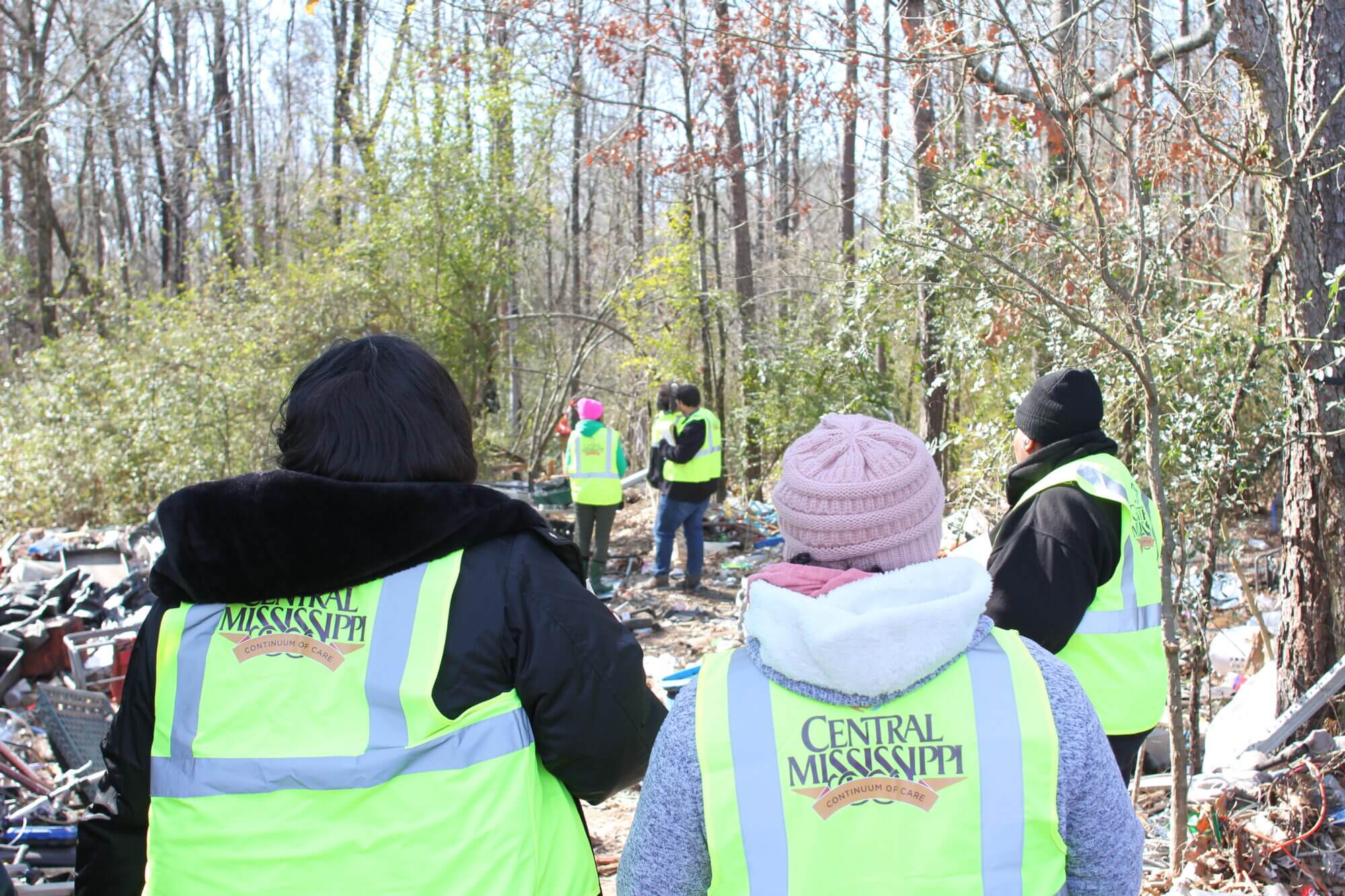

“Anybody home?” Dee Dee Barlow Moore shouts from the window of her Jeep as she pulls up to a homeless encampment in North Jackson known as The Hill. Her truck is loaded up with clothes, water, gallon ziploc bags filled with snacks and 30 pound bags of dog food. Moore is a volunteer who spends her days supporting the homeless community and rescuing animals from the streets.
“This is what feeds my soul,” Moore said. “Serving these people gives me purpose and it actually makes me feel like I’m contributing and I’m trying to improve someone’s life. It may not be a big improvement. It may be enough for them to know that someone cares.”
Around Jackson, people experiencing homelessness have said their paths to being homeless have all been different. Josh said he lost his job during the COVID-19 pandemic. He decided to go into business restoring sport bikes, and after he put all of his money into one project, someone stole it from outside of the Motel 6 where he’d been staying. He lost his income, and within the month, he found himself on the streets for the last two years.
“I couldn’t pay for my room anymore, and it just snowballed from there,” Josh said.
Phillip, who is disabled, said he’s been homeless for the last five years.
“I had no place else to go but a shelter or a halfway house, and they’re just too messed up to go to,” said Phillip. “I try to stay away from drugs and that’s where they’re at. So I just stay in the woods.”
Preston Martin has been living in an encampment for over a year. He was released from prison and is now caught in a legal fight over his parole.
“They wouldn’t let me go home, so this was the next step,” he said. “I don’t have anybody in Jackson, and I really don’t have any family to this day.”
Another man experiencing homelessness closer to Downtown Jackson, Giom, a Marine veteran, said that in his two years on the streets, his encampment has become a safe space for homeless people.
“This is the village is what we call it, and this is a family,” said Giom. “We take care of each other. People have been mistreated in other spots. This is a sanctuary for them. This is where they’re going to be safe. This is holy ground.”
Anti-camping bills are being introduced in the Mississippi Legislature this year, following the U.S. Supreme Court’s ruling in the City of Grants Pass v. Johnson, which allows cities to ban public sleeping, targeting homeless populations.
Compared to other states, Mississippi has one of the lowest numbers of people experiencing homelessness, according to data from the 2024 Annual Homelessness Assessment Report from the Department of Housing and Urban Development. Jackson has been praised for avoiding the homelessness crises other cities have experienced.
But that hasn’t stopped lawmakers from introducing legislation that could ban public camping or prohibit panhandling.
“It’s a national topic, so I think they’re kind of jumping on the bandwagon, because honestly, our homeless numbers aren’t near as high as a lot of other states,” Moore said.

House Bill 1203 passed from the Mississippi House on Feb 5. Authored by Rep. Shanda Yates, an independent representing Jackson, the bill would prohibit camping on property that is not a designated space by a municipality or the county.
If passed into law, anyone who violates the bill and is convicted can be charged a fine of $50 after a hearing before a judge. The bill also states that alternative penalties may be imposed, but those penalties may not include jail time.
“The goal is to obviously encourage those who are sleeping on the street to go to shelters or other resource centers as opposed to sleeping on the street,” Yates told Mississippi Today. “None of us feel that those who are sleeping on the street are getting resources or help that they need. There’s nothing on the street to help anybody there.”
The bill was met with pushback from House Democrats, with many questioning whether the bill would infringe on the rights of people experiencing homelessness.
“If I’m homeless, do you think I have $50 to pay for a fine?” asked Rep. John Hines, a Democrat representing Greenville, during the Feb. 5 floor debate.
“I don’t know what people do or do not have. I’m not here to speculate on that,” Yates replied.
Rep. Gene Newman, a Republican representing Rankin County, who introduced a similar unsuccessful bill, told Mississippi Today, “I’m not trying to be punitive to people. This is just trying to make sure they’re not infringing on other people’s rights by camping on the streets.”
The Senate advanced a separate bill, Senate Bill 2334, that would not only prohibit public camping, but also target panhandling by prohibiting solicitation without a permit, and provide for the removal of encampments after 48 hours.
And in Jackson last year, the city council introduced an ordinance banning public sleeping outside. Ward 7 Councilwoman Virgi Lindsay said she received calls from her constituents, concerned about the unhoused taking over public parks.
“I was really hoping to bring the matter into focus so that we would have more energy and effort put into finding alternative housing solutions. What I came to realize was that it’s just such a complex and complicated issue,” Lindsay said.
The Jackson City Council postponed the vote indefinitely in December, which Lindsay said was to give council members more time to study the homelessness issue.
“I pulled the ordinance back because I think there just has to be more conversations, not only with the agencies that are providing services to the unhoused at this time, but also other nonprofit and church organizations to see if we can come up with a better plan to address the unhoused needs,” she said.
Homelessness advocates worry about what these bills, and potential fines, could mean for the homeless communities who are having to do without, especially as community conversations point to bans.
In the early morning hours in late January, Dawn Magee pulled a yellow vest over her winter coat in preparation to head into the woods in search of homeless encampments around south and west Jackson. She’s a volunteer for the Central Mississippi Continuum of Care, and she’s participating in a federal census known as the Point in Time Count, or PIT Count, when organizations across the country take a count of their homeless populations.
Magee, assistant administrator at Utopia Assisted Living, said she volunteers because it puts into perspective how much effort people experiencing homelessness put into building a community.
“You have the stereotype of homelessness that everyone is familiar with,” Magee said. “But when you go into the encampments, you see that there is actually a community. They look after each other. They take care of each other.”
The PIT survey starts like this: “Where did you sleep on January 22nd?”

Since 2005, the Department of Housing and Urban Development has required states to conduct a yearly census of their homeless populations in order to receive funding for homelessness services, such as permanent rehousing, rapid rehousing and shelters. Nationally, experts agree it’s a flawed count, often resulting in a much smaller number than the actual population.
The count attempts to quantify the number of homeless people who are sheltered, meaning the person is residing in temporary housing or a shelter, and unsheltered, those who are sleeping in places not meant for habitation, such as sidewalks, encampments and or abandoned buildings.
“It gives us a snapshot of our homeless population to show a snippet of how homelessness looks on one specific night within our five counties,” said Melvin Stamps, Planning Director for the local Continuum of Care organization covering five central Mississippi counties including Hinds County, where Jackson is located.
Local organizations are supplemented by funds from the Central Mississippi Continuum of Care. On average, the COC grants out about $1.3 million in federal dollars. For the 2025 funding year, that number increased to nearly $1.6 million. Stamps said every dollar gets into the hands of organizations.
“I can definitively say that all the service providers that are all funded through the COC, all of the money is expended and used within that granting period,” Stamps said. “We don’t have any money that has been recaptured that would cause them to not give us more funding.”
Data from the Central Mississippi Continuum of Care show the number of people experiencing homelessness in the region has pretty steadily declined since 2007, the start of available data. The count was the largest at 1,300 in 2008, then ranged from about 400 to 800 between 2015 and 2020. By 2024, the rate of people experiencing homelessness dropped to 273. About two-thirds were male, and more than half were Black.
Stamps credits community awareness events and job fairs for the declining numbers, saying people who were at risk of becoming homeless were directed to resources, such as rapid rehousing or transitional housing.
“Any individual who had been identified to be homeless or at the verge of becoming homeless had providers and us who could be able to assist them and refer them over to a housing provider to ensure that their homeless experience, or potential homeless experience, will be brief and rare,” said Stamps.
But local homelessness organizations say according t0 the requests they receive, the city is facing an influx of need. “Based on the phone calls we get daily, and we’re just one organization, the numbers are not accurate. They’re inaccurately low,” said Jackson Resource Center CEO Putalamus White.
Moore worries that the proposed legislation will lead to unnecessary jail time for the remaining homeless people who are trying to survive.
“They don’t have a dime to their name, don’t have clothing, don’t have hygiene products. Where are you going to put them?” Moore said. “If you take them to jail, how long are you going to hold them? Because you can’t hold them for something like that for long, and they’re going to be right back where they were.”
Lisa, who lives in an encampment in West Jackson with her husband Eric, worries about run-ins with police. She said that sometimes, homeless people are lumped into one with those who are committing crimes.
“We got people out here doing stuff that’s not right, and all homeless people get blamed for it,” said Lisa. “We get profiled from having a backpack on. They say we’re a thief. I get accused of being a thief and I’m not. I don’t bother people. I try to stay out of the way, because my life has been threatened.”
The Jackson Police Department said that the department will continue to respond to crime related calls that involve homeless people, though they aren’t looking to criminalize homelessness.
“Being homeless is not a crime, so we don’t go around the city telling people to move,” said Tommie Brown, Public Information Officer for the Jackson Police Department. “We don’t go around tearing down encampments. We only respond to crime related calls.”
Brown said JPD has a community engagement unit which supplies homeless people with resource guides for where to find shelter. If either bill makes it into law, JPD will enforce it, but Brown said there are a lot of issues to be addressed before the bill could work the way it’s intended.
“In order for the city or any city to be effective in enforcing laws that move homeless people along, or move them outside of what they have established as their place where they’re living or staying, the city needs to have options or alternatives to places where they can stay,” said Brown.
Ward 5 Councilman Vernon Hartley said the issues of homelessness can be a drain on City resources such as the police and fire departments.
“Right now we have fires all over the city,” said Hartley. “Some of them are related to homeless individuals trying to stay warm. It taxes our resources, and we don’t have a strategy, a plan to deal with it. So, I am encouraged by the state stepping up and saying, ‘Hey, we’re going to create laws.’”
Hartley said in a December City Council meeting that his ward has the bulk of the homeless population, around 80 percent he estimated. He’s concerned about the City’s ability to mitigate the issue without a designated homeless coordinator – a position it filled in the past – or the infrastructure needed to tackle the challenges that people experiencing homelessness deal with.
Mukesh Kumar, a former Director of Planning and Development for the City said it helps to have a homeless coordinator because the city could concentrate mitigation efforts through one office.
“It doesn’t have to be one person, but what it does is allow you to coordinate in a more organized way, but you still have to deal with several different entities,” said Kumar. “It’s not purely a housing problem, and having a coordinator allows you to coordinate all the services that you’re trying to provide.”

A homeless coordinator acts as a liaison between the homeless person and city and government resources. Because Jackson doesn’t have a homelessness coordinator, there isn’t a dedicated person in the city who can direct homeless people to those entities, such as nonprofit organizations and church groups, housing assistance or veteran services.
“One can’t treat the unhoused population as they have the same problem, so you have to determine what approach you want to take to help the most people,” said Kumar. “It’s almost never a one size fits all challenge, and no two cities are going to be alike.”
The city did recently approve a project with Jackson Resource Center to build a 60-unit tiny house village for very low-income Jacksonians, designed to address homelessness, in west Jackson, but months after the approval, White told Mississippi Today the city has yet to deliver a signed contract for the organization to break ground.
The City has not responded to repeated requests for an interview to discuss its strategy to address homelessness.
Mississippi Today requested the city’s 10-year strategic plan to end chronic homelessness, data gathered through the city’s participation in Functional Zero, and any other documents related to the city’s homeless programs.
The Built for Zero initiative seeks to ensure homelessness is rare and brief in communities across America, with Functional Zero set as a major milestone. Functional Zero means the number of people experiencing homelessness is not greater than the available housing during any given month. It requires cities to collect comprehensive data on their homeless communities and create equitable solutions.
The City only provided one document, the strategic plan drafted in 2006.
“The city needs to take leadership and at least develop a comprehensive plan to deal with homelessness, which includes some non-profits, but we need to take the lead,” Hartley said. “We need to first admit we have a problem. The second thing we need to do, in addition to admitting that we have a problem, is to say, ‘Here’s the plan of how we’re going to deal with it.’”
The post In a city without a plan, anti-public sleeping bills pop up at Jackson City Hall and state Capitol appeared first on Mississippi Today.
- UMMC keeps clinics closed and cancels elective procedures Monday and Tuesday amid recovery from cyberattack - February 22, 2026
- With school choice, what about the students left behind? - February 22, 2026
- Scott Colom raised most money, but Cindy Hyde-Smith has most cash before March primary - February 21, 2026